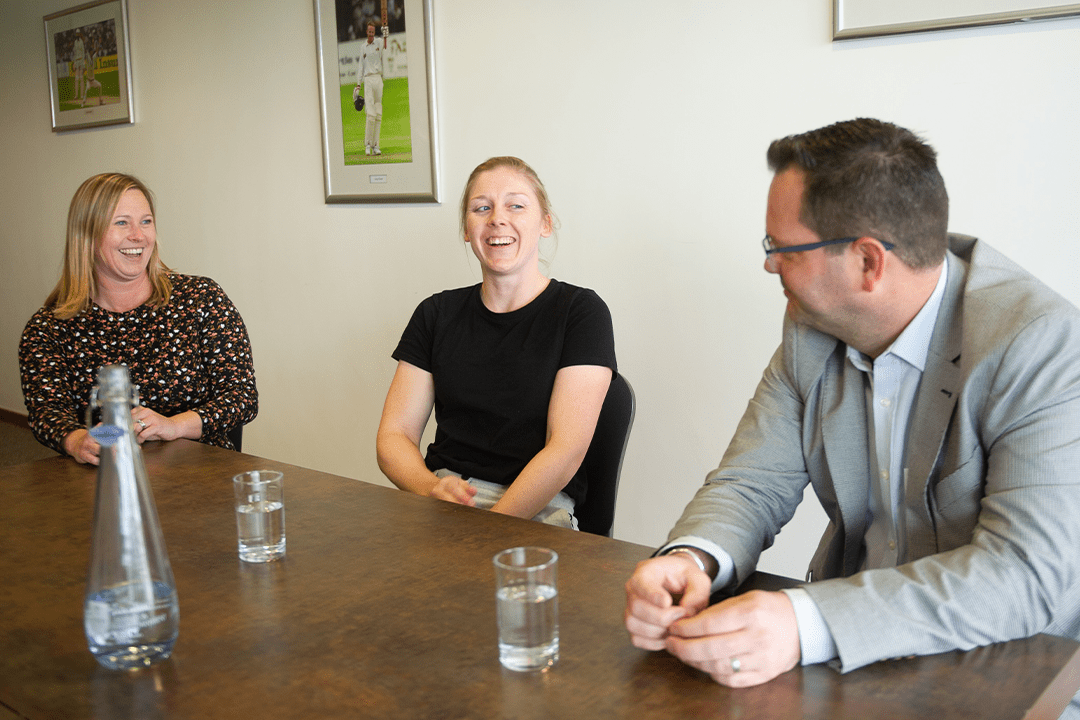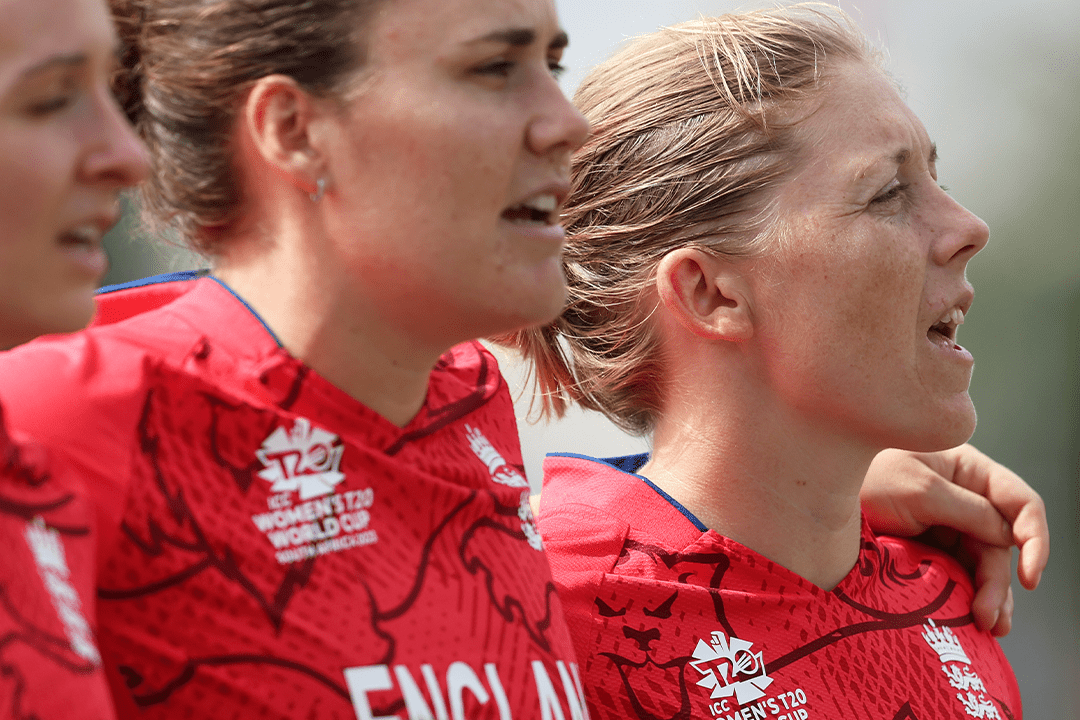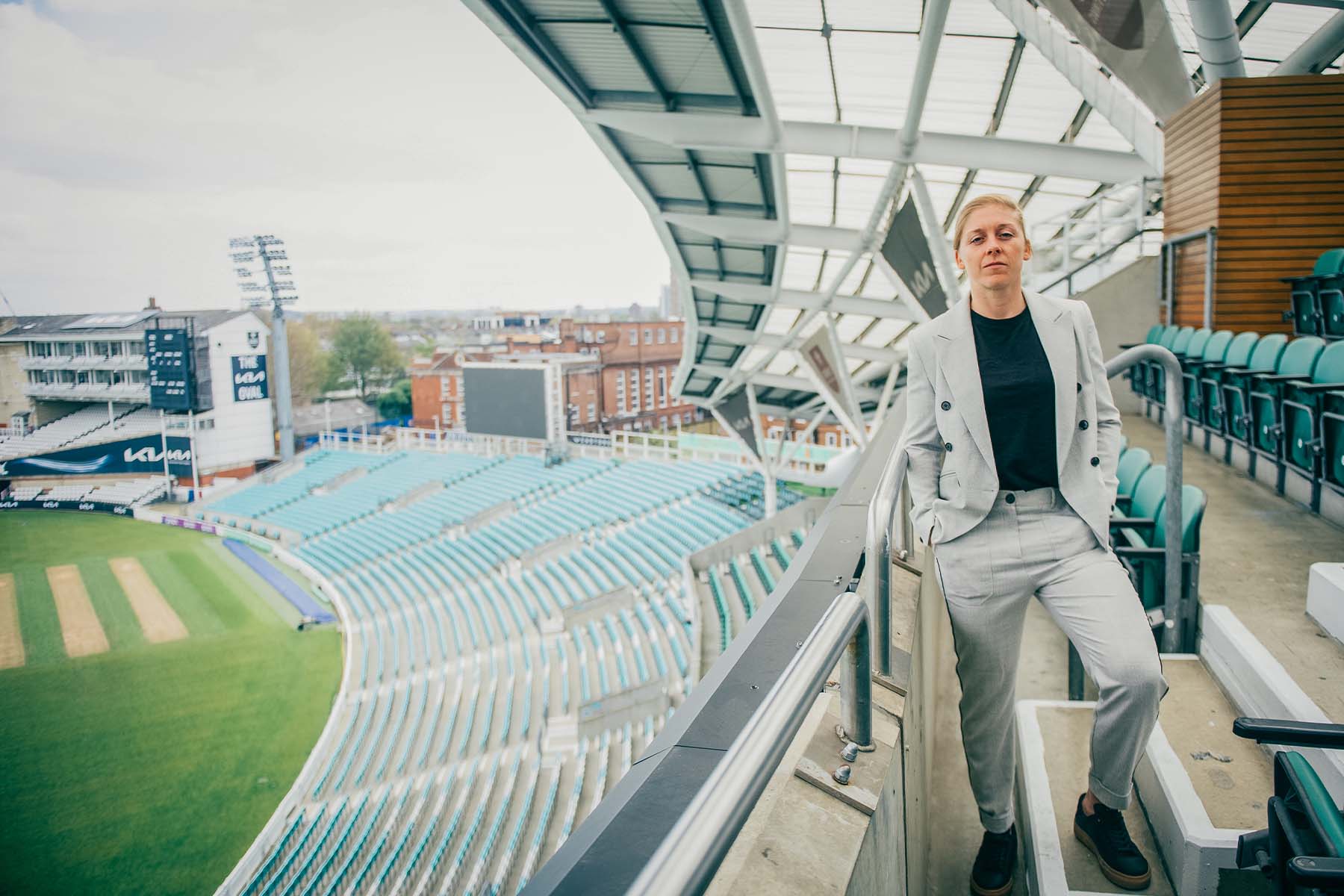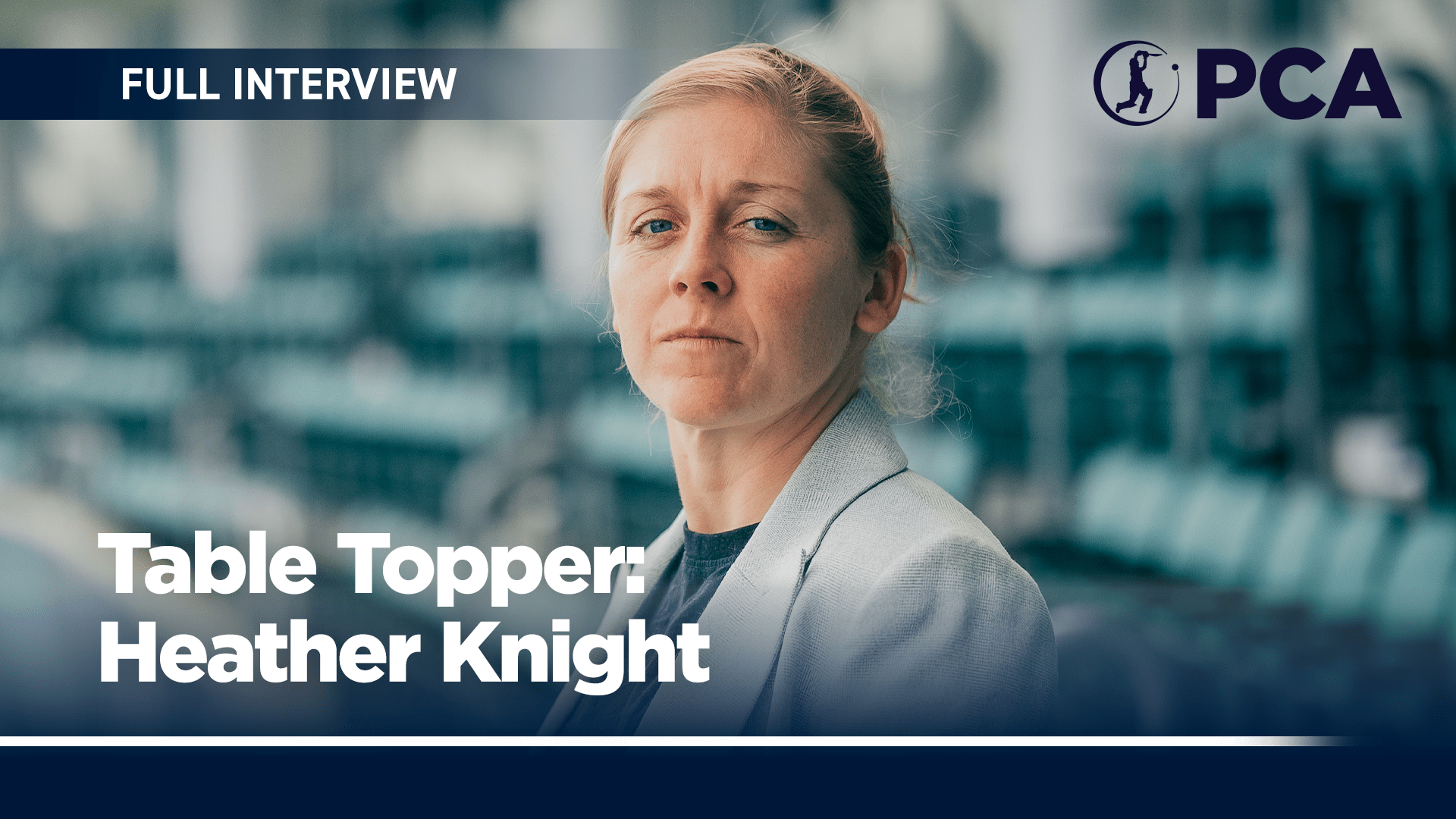PCA PRESS RELEASE
England captain Heather Knight sat down with Beyond the Boundaries ahead of the Ashes.
To see more articles, click here
The cover star of issue 32 of the PCA’s membership magazine Beyond the Boundaries, Heather Knight’s role as England captain transcends the boundary rope. Also the Vice Chair of the PCA, she sat down with Ollie Collins to look at her career on and off the field.
The rise of women’s cricket in recent years has been stratospheric. From professionalising the domestic game in England and Wales to the eye-opening figures being offered for participation in the Women’s Premier League (WPL).
The sport is unrecognisable from when Heather Knight started her international cricketing career in 2010, even the thought of a professional England Women’s team and a central contract felt a lifetime away.
Taking over the England captaincy in 2016 at the age of just 25, Knight now has a wealth of experience in her role on the pitch. However, behind the scenes, her influence in offices and boardrooms alike make her off-field actions arguably even more impressive.
Knight has proven a beacon for change. Pivotal, even, in the creation of the England Women’s Player Partnership (EWPP) in 2017, which successfully represents the interests of England’s international women cricketers in their contractual and commercial rights.
PCA VIDEO
Heather Knight Exclusive
The cover star of issue 32 of Beyond the Boundaries, Heather Knight’s sits down with the PCA’s membership magazine...
A keen interest in the ‘bigger picture’ of sport, she has also recently completed a Masters degree in Leadership in Sport, adding qualifications from the classroom to her experience in the boardroom. An impressive CV, and growing by the day.
The 32-year-old currently sits on the FICA Player Advisory Group for the global game and holds one of the vital positions within her own players’ association. Taking up the board position in 2020, she is the Vice Chair of the PCA to underline her influence on a domestic, national, international and world stage.
“I know the PCA is a key stakeholder and is pushing the ECB for improvements in the women’s game across the regions and hopefully it can continue and we can all work together to keep pushing the game forwards,” said the Vice Chair. “I’ve always said wanted to leave the game in a better position than when I started, whilst enjoying the journey of putting that in place. I find the boardroom conversations particularly interesting, especially so at the moment. With the women’s game going through the roof.
“It’s so important the players have a voice and they’re able to shape things and give their opinions because ultimately players will decide where they play, international or domestic.”
On the pitch, the all-rounder was most recently involved in the WPL with Royal Challengers Bangalore, whose captain Smriti Mandhana’s services sold for £340,000 at auction, with this ‘significant moment’ creating history in the women’s game.
“The WPL was awesome to be involved in,” states the England star. “Indian fans are passionate, and playing for an established team like RCB you really felt that support. To witness the breakthrough that women’s cricket has had over there, culturally, was amazing. Obviously, the money involved was a ground-breaking moment in women’s cricket.”
The sale of the five new franchises cost owners an astonishing £455 million, there was just shy of a million pounds on offer as prize money in addition to the salaries which amounted to £6 million, against the sale of 87 players. And to top it off, the five-year broadcast deal, bought by Viacom18, was worth a staggering £100 million. These are figures that would have been unimaginable just a few years ago.
Knight’s RCB side may have finished fourth out of five, but she believes the tournament has done wonders for advancing the women’s game and giving valuable experience to some young English players. “It really did feel like international cricket,” added Knight. “It felt like a big world tournament with all of the associated pressure to perform as an overseas player. It was huge for some of our youngsters being able to play and prove what they can do on the big stage.”

With all the talk of the WPL, naturally conversation turns to the topic – and balance – of international over franchise cricket. With the recent high profile international retirements of Deandra Dottin and Lizelle Lee – both choosing to focus on franchise cricket – I asked the England captain if she’s worried about players potentially turning down the opportunity to represent their country. Bolt upright in her seat, she smiles. “Not yet, but I think it’s something to keep an eye on.
“There’s three main domestic competitions currently (the Big Bash, The Hundred and the WPL) and they’ve carved out little windows, but they’ve been so successful that they’ll definitely want to increase the amount of games played. Then I think SA20 and Major League Cricket will want a women’s version in the near future.
“The calendar will get busier and busier and international cricket could well be affected by players just wanting to play within the franchise system, so it’s important we protect international cricket.”
England great and current PCA President Charlotte Edwards recently ruled herself out of the England Women’s Head Coach role, stating franchise leagues are more competitive than international cricket. I asked Knight for her thoughts on Edwards’ comments.
“I think potentially it’s the same in the men’s game. Simply because it’s much easier to change the teams in franchise cricket. Every season there can be a completely new draft and you can rebuild your team, you can’t do that in international cricket.
“As a player I get the most pleasure out of international cricket, and for me playing and watching international cricket is the pinnacle, the narrative and the stories are much more interesting. The aim is obviously for international and domestic cricket to thrive alongside each other.”
"We seriously need to look at the distribution of money around the world in the women's game."
HEATHER KNIGHT
Despite the obvious advancements in women’s cricket recently, Knight is concerned about inconsistencies between the men’s and women’s games that she’s witnessed. “Playing at Western Storm there is sometimes issues with facilities and I think trying to work out where the women’s regional system sits alongside the men is important.
“We also need to make sure that those employment conditions are equal. Alongside trying to make the women’s game fully professional. I think that has to be a priority in the next couple of years. Once that structure is in place, we’ll start to see massive benefits from that, not just in the domestic game but for England as well. But there’s still a lot of work to be done.”
England’s recent winter tour to the West Indies highlighted the disparity between the state of the women’s game across the world. A lack of money, media attention and technology made for what felt a somewhat second-rate series despite the great result for Knight’s side.
“We seriously need to look at the global distribution of money in the women’s game,” adds Knight, in absolute certainty. “Playing in that series felt like a low-key event for a lot of us. There was no media in attendance, no DRS, no cameras for third umpire run-outs and nobody watching because it wasn’t promoted. We need to make sure there is money available to properly promote international series.”
Once the Ashes have been decided and August is upon us, love it or hate it, attention in the English game will once again turn towards The Hundred. Undoubtedly, one of the competition’s successes has been the heightened focus on women’s cricket but the London Spirit batter believes there is still changes that must be made. “The women’s competition has been an integral part of The Hundred, it’s the biggest positive to come out of the competition from my perspective but I do think there is scope to push the women’s salaries up there with the men’s.
“The men’s competition is up against other tournaments around the world and they’re going to have to raise money too to keep the best players, it’s exactly the same in the women’s game. The WPL has set the standard and you’re going to get players picking and choosing where they play. The women’s game being marketed alongside the men in The Hundred is great and it’s important this is able to continue.”

Having not won a global tournament since 2017 and no Ashes victory since 2013/14, I asked the Three Lions leader whether she sees a gap emerging between the countries that are investing more money into the women’s game, such as Australia and India. “With the domestic system the way it is now, it’s finally starting to give us a pool of more competitive players and improving the depth of the England team. I still think we need to push it to the next level.
“The ECB has done a lot – and so much has changed – it has been remarkable from when I started playing. However, we need to keep pace with other countries and to do this more investment is needed, that is clear.”
With important off-field discussions surrounding the next Regional Partnership Agreement around the corner, Knight is anticipating positive changes to arise from the PCA’s Fairer Futures paper version two. The first document set about tackling inequities whilst improving employment conditions and the pay of England women’s cricketers.
“The PCA support over the last couple of years has been outstanding. The players have really appreciated it and benefited from it. I know that Emma Reid (PCA Head of Player Rights and Women’s Cricket) is working hard on this at the moment and the second draft is going to be about trying to push the game forward and improving playing conditions and the game as a whole because it’s growing so fast, it’s important that we keep this train going.”
The Ashes
Sat in Box 45 of the JM Finn stand at The Kia Oval, the destination for the second Vitality IT20 of the Ashes, we are reminded of the imminent arrival of one of the most successful sports teams on the planet. That being the Australian Women’s cricket team. Over here for what is shaping up to be a momentous series.
“I’m really excited for the Ashes. Ticket sales are going really well and hopefully that home support can have a huge impact and help us put pressure on the Aussies. Obviously, they’re a really good team, they’re highly skilled and very good in big tournaments and we’re going to have to be at the top of our game to beat them. The way we do that is by having an aggressive approach. We’ve got some worldclass players of our own.”
Ben Stokes and Brendon McCullum have revolutionised Test cricket in the year that they’ve been in charge, and Knight believes
that her side’s approach mirrors that of the men’s team.
“I’ve got no interest in the Test being a draw, I’m so happy we’ve got a proper five-day game. I haven’t won a Test as captain and I haven’t lost one either because the weather has always intervened so I’m really keen for a result.
“We’re playing the Test at Trent Bridge with the Barmy Army present in front of a big crowd, that’s going to benefit us. Our
approach is certainly similar to Ben and Brendon’s, we don’t play a lot of long format cricket anyway, so our game is naturally more aggressive. Our way of playing is to entertain and to try and advance the game, we want to make it fun to watch because at the moment it feels like we’re fighting just to be able to play Test cricket at all.”
Read the summer 2023 issue of the PCA’s membership magazine, Beyond the Boundaries…








